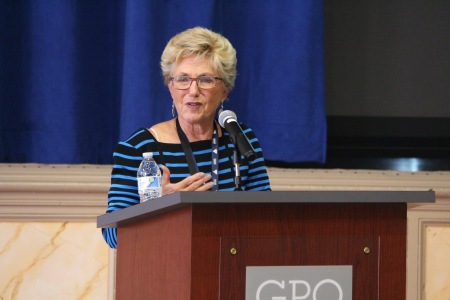USCIRF chair: Biden admin. will be 'just as strong' on religious freedom as Trump was

As President-elect Joe Biden is set to be inaugurated on Jan. 20, the chair of the U.S. Commission for International Religious Freedom believes the incoming administration will continue the religious freedom successes of the Trump administration.
Gayle Manchin, the wife of Sen. Joe Manchin, D-W.V., and who has served with the congressionally mandated commission tasked with advising the executive branch and Congress about global religious freedom matters since 2018, told The Christian Post that she has spoken with the Biden administration’s transition team about the issue of religious freedom.
“The Biden administration will be just as strong,” vowed Manchin, a former first lady of West Virginia. “I certainly congratulate the [Trump administration]. Trump put a spotlight on [religious freedom]. I believe the Biden administration will continue that.”
The work of USCIRF on religious freedom is important to the world because it’s the only government organization of its kind, she noted. Other countries don’t oversee international religious freedom in the same way the U.S. does.
“We’re the only ones that take an interest in how Pakistan or Azerbaijan or Egypt are treating their citizens,” she said.
One of Trump’s religious freedom innovations was to appoint a permanent special adviser for international religious freedom to his office, said Manchin. This decision has allowed religious freedom concerns to receive attention when the president makes important decisions on foreign policy.
“I would hope that is something that will continue in the new administration,” she said. “I think the Biden administration will be very open to working with USCIRF and all of the groups involved with religious freedom.”
Both Republicans and Democrats serve on USCIRF and work together to advance the cause of religious freedom. The rest of Congress should take an example from USCIRF’s healthy bipartisanship, said Manchin.
The secret to its success is personal relationships, she explained. Members of the commission spend time together, talk about their families and build friendships.
“We met each other as individuals, not as ‘you’re a Republican and I’m a Democrat and I’m not going to like you,'” she said. “We realized very quickly that we all shared one same passion and that was to help individuals around the world to practice their religious faith in safety and peace. It’s a shame that Congress can’t follow our lead.”
Manchin said the commission’s greatest successes in 2020 include seeing Sudan improve its religious freedom laws enough to leave the State Department’s list of "Countries of Particular Concern" for religious freedom. Countries with bad religious freedom records, including Uzbekistan, Bahrain and Indonesia have often sent representatives to speak with USCIRF about how they can do better.
“Under [Sudan’s] new government regime, they have certainly started turning around the laws of that country to give women more freedom, to give religious minorities more freedom,” she said.
In 2020, COVID-19 brought new challenges for USCIRF, the chairwoman said.
Commission members couldn’t travel to other countries to interview locals on religious freedom because of COVID-19 restrictions. Also, some governments seem to be using the pandemic as a justification to restrict religious freedom.
“You have to be careful. It requires oversight to see that a country is not using the pandemic as an excuse to punish minority religions," she explained. "It will be interesting as we get oversight to make sure that restrictions that have been placed on religion will be lifted [when the pandemic ends]."
Manchin said she was also concerned about the human rights situation in Nigeria, China, Pakistan, India and Egypt. In those countries, it has become harder for people to worship freely. Events in China indicate the government there is leading a genocide against Uighur Muslims, she argued.
USCIRF recommended the State Department to label India as a Country of Particular Concern for religious freedom, but the department refused.
“We realize on the bigger picture that the State Department has to balance many entities and it looks at every country in the world. We reach out and look for those that are most egregious, but we don’t have to consider domestic issues and economic issues. We focus on the religious aspect,” said Manchin. “When the State Department is weighing and balancing and making their decisions, we understand the diplomacy that is involved in these situations. We obviously continue to push them on countries that we believe have met all the criteria.”
Another problem for USCIRF in 2020 has been a rise in anti-Semitism around the world, Manchin said. It remains unclear exactly why this rise has taken place.
“You can’t even pinpoint a country. It’s very troubling. It’s not something you want to see happening in our world,” she said. “The whole thing about ‘the Holocaust was a hoax,’ how does that resurface again?”
The actions of Americans for religious freedom can make a difference on the other side of the world, she said. When cases of religious persecution get publicity in the U.S., countries often change for the better because they don’t want a bad reputation. When Congress leaders support people imprisoned for religious freedom, world leaders pay attention.
“I do think that more and more the message is getting out about human rights and that they are not being honored and respected in these countries,” said Manchin. “When I think about the freedoms that I enjoy every day of my life and that there are individuals around the world who are in danger for trying to practice their faith, it’s important on each of us to play a part to make that situation better. We all have an action we can take.”





















